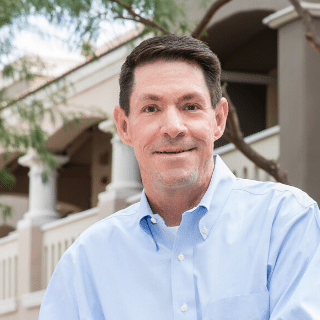Beyond the unicorn obsession: Three Nordic companies that scale impact
November 2, 2022
They built their company from $100 million to $650 million in annual revenue by using the Scaling Up platform
November 16, 2022By Verne Harnish
Ray Bailey is on the move at Lone Star Communications. The company, headquartered in Grand Prairie, Texas, helps institutions like hospitals communicate about everything from scheduling to exiting a building safely in an emergency, using one system.
Bailey has used the Scaling Up platform to grow the company from $26 million in annual revenue to a projected $71 million for 2022, with 285 employees. He founded Lone Star Communications in 1991 after working for another firm in the industry and, before that, serving as a bush pilot in Alaska following service in the U.S. Air Force. The company has expanded through a series of acquisitions—four to date—using the methods he learned from Scaling Up to keep the team cohesive.
Bailey found out about Scaling Up when I spoke at the National Systems Contractors Association conference a few years back. He purchased a copy of Scaling Up: Rockefeller Habits 2.0, began applying what he learned, and then attended a Scaling Up CEO Bootcamp in 2017 in Marathon, Florida. Immediately after that, he attended a Scaling Up Class in Atlanta with his senior staff, and the following week he sent his middle management team to a one-day Scaling Up class in Dallas, where his staff met Scaling Up Certified Coach Mark Fenner. He later engaged Fenner as his coach.
Working with Fenner helped Bailey put the company on its current trajectory of rapid growth and to develop as a leader. Here is how he applied the platform to his company.
Getting clear on goals
Completing the One-Page Strategic Plan (OPSP) with Fenner—and updating it every quarter—Bailey created a strategy built around the company’s Big Hairy Audacious Goal (BHAG) of building his team to 1,000 “rising star” employees. The company defines “rising star” as self-directed “A players.”
Completing the OPSP helped the company set and get aligned around three Core Values: “One team. One purpose. One family.” That was important in creating team unity as Lone Star Communications acquired four companies and scaled to eight offices in its region.
The company also aligned itself around its Purpose: “Making communities safer—What we do matters.” Another core purpose is family—and that includes colleagues. When Hurricane Harvey caused flooding in Houston, the team in Grand Prairie sent a truck. “A dozen people took a truck filled with hard-to-find supplies for repairs, drove down there and helped out for a few days,” recalls Bailey.
Taking the pulse
The company conducts regular surveys to understand how employees are feeling and what they want–and has responded to that as its culture evolved. “Over time, what we learned from those surveys is people are looking for places they can stay forever,” says Bailey. “What we found is with the younger crowd, they wanted to know where they would be in five years, what their future would be.”
To build a strong culture, Bailey hired a talent development manager who had experience as a teacher and school principal. The goal of the talent development manager was to talk to all employees and help them discover what their goal was, and where they wanted to be in five or 10 years. Then they would lay out a plan together to help the employees build their education and resume to meet these goals.
Fine-tuning execution
In acquiring four companies, Bailey realized he had a wealth of on-staff knowledge about getting things done. “That is one of the biggest gains out of this: experience,” he says.
He and his leadership team have taken the time to inquire about how the acquired companies were getting things done, and then brought the best practices to the whole company. For instance, when an acquired company in Central Texas shared how it was handling software maintenance agreements, the whole company embraced its approach, relying on the team member who shared it as a point person. “That individual has become the key person behind everyone in the company,” he says.
There was another valuable discovery as Lone Star Communications acquired companies: Not all talent had to be at the main office in the Grand Prairie/Dallas-Fort Worth area. Since 2017, starting with its main office in the Dallas-Fort Worth area and an earlier acquisition in Houston, it has bought companies in Little Rock, Arkansas; Grand Prairie, Texas; Dallas-Ft. Worth, and Central Texas. “As we brought companies together, we found HR strength in Little Rock and payroll expertise in Austin, Texas, yet our recruiting is based in Grand Prairie,” says Bailey. “These employees work together seamlessly to create our corporate HR department. We established working remotely even before Covid forced everyone home, which made the working from home a very easy transition for Lone Star, resulting in growth even during the pandemic.”
Keeping growth humming
Thanks to its acquisitions strategy, Lone Star Communications continues to see rapid growth. “With those four companies, we have dominated the state of Texas and a lot of Arkansas, Louisiana and Mississippi,” says Bailey. “We’re a regional company but with this latest acquisition will become a national company covering the entire U.S. Our goal is to be the biggest and the best.” With the right systems and processes in place to keep his fast-growing team aligned, it looks like Bailey is well positioned to go after his BHAG


